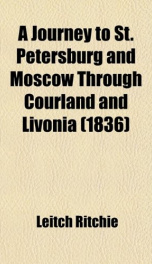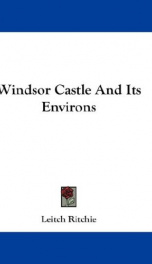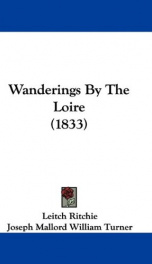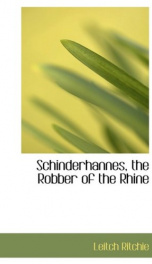a journey to st petersburg and moscow through courland and livonia

Purchase of this book includes free trial access to www.million-books.com where you can read more than a million books for free. This is an OCR edition with typos. Excerpt from book: CHAPTER III. Departure for Petersburgfellow-travellersnight adventuresLivonian peasantstheir mode of livingloves marriageshousesthe girl and the wifepolitical conditionprogress towards libertymode of letting the lands noblesarrival at DorpatEsthonian womenmiserable villagelake PeipusRussian colonyNarva, and the fall of the Narovanight-scene on the river Lagasystem of territorial banksarrival at St. Petersburg. Notwithstanding the constant intercourse between Riga and St. Petersburg, the diligence goes only once a week. It is, therefore, always full; and as, at this season more especially, owing to the bad state of the roads, it is a mode of conveyance chosen even by those who usually travel in their own carriages, the stranger should not lose a moment in securing his seat. I was fortunate in my fellow-travellers. Among the rest, we had the pastor Sarae, a Lutheran priest of Moldavia, so far on his way to solicit the FELLOW TRAVELLERS. 31 protection of the emperor for his church. This he would, no doubt, readily obtain; for the Russians, like the ancient Romans, unite in a remarkable degree, the extremes of tolerance and superstition. There was, also, M. Hartung, a German, whose business in the metropolis was to teach the Guards to shoot. He had invented a very simple machine, by means of which an officer, standing behind a soldier about to fire, can direct his aim with unfailing accuracy. M. Hartung considered that a few lessons given in this manner would be worth half a lifetime of practice in the ordinary way; and the emperor seems also to have judged favourably of the plan, having bestowed a pension and an order upon the inventor. Hartung was a gunsmith, and is a simple, peaceable man, with no more thought of blood in his mind than an angler ...
Info about the book
Author:
Series:
Unknown
ISBN:
0813028310
Rating:
3/5 (3)Your rating:
0/5
Languge:
English
Users who have this book
Users who want this book
What readers are saying
What do you think? Write your own comment on this book!
write a commentif you like a journey to st petersburg and moscow through courland and livonia try:
Do you want to read a book that interests you? It’s EASY!
Create an account and send a request for reading to other users on the Webpage of the book!








